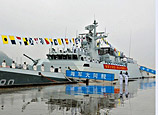
JOINT EFFORTS HAVE PRECEDENT
The ongoing anti-drug campaign is not the first time the four countries have cooperated to prevent crime on the Mekong River.
Police forces set up joint patrols after hijackers killed 13 Chinese sailors on two cargo ships in a Thai section of the waterway on Oct 5, 2011.
At Guanlei Port in Yunnan province's Xishuangbanna Dai autonomous prefecture on Friday, Chinese officers were scheduled to leave on three vessels to join counterparts from Laos for the 10th patrol mission, due to last three to four days.
Cargo ship owner Tao Youming welcomed the action. He witnessed the massacre in 2011 and said he has had great concerns on the river's safety ever since.
"I have also been robbed while transporting goods," said the suntanned 40-year-old, a sailor for more than two decades. "The armed robbers took my cash and cellphone."
He said many speedboats blocked his way back to China in order to get money, which always made him nervous as he sailed on the river.
"Now such danger is hard to see thanks to the patrols and the anti-drug campaign," Tao said. "It has been a long time since I've seen a robbery while sailing."
Liu Yan, 26, a cook on Tao's boat, said those who intend to get on the ship must have their luggage checked and show their identity certificates.
"It's dangerous to pick up strangers on the river, because sometimes they may carry drugs and rob us," she said. "To avoid that, we seldom agree to take them.
"I was frightened after sailing to Thailand, but now I'm relaxed, because I can often see patrol ships on the river," she added. "My husband also works on the boat, which is another reason I'm never scared about the dangers."

















 Many register as couples on '5.20' day
Many register as couples on '5.20' day


![]()
